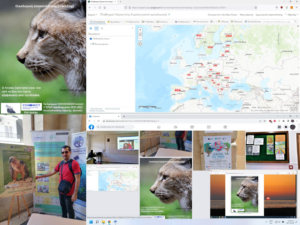News . Best Practices In the steps of a lynx

This good practice presents an open schooling education initiative for the reintroduction of the lynx, developed by the students of the 1st Vocational School of Arkalochori and the teacher Apostolakakis Avraam from 1/10/2021 to 20/5/2022. The activities were attended by a scientist, Dr. Yasmi Stathi. The Regional Directorate of Primary and Secondary Education of Crete and the Museum of Natural History of Crete supported it. This practice was previously presented on the program platform (HERE).
At the same time, there was support for the new teachers who participated in the program (through coaching and optimization of the material provided). The program participated with a poster at the presentation of European programs of the Regional Directorate of Crete (where school supplies were collected for the earthquake victims, who are also students of the school ). Finally, there was participation in the CONNECT student conference. The results of the program, in addition to the platform, were announced on the school notice board, the school Facebook page and the teacher’s personal blog.
Care: The students studied a real problem concerning the reintroduction of the lynx that has disappeared from the Greek area. The students who participated in the activities were 12, aged 17, from the 3rd grade of EPAL.
Know: Students used knowledge of food chains and food webs. Students practiced being able to describe the effects of ecological restoration on an ecosystem. They also learned to weigh evidence to support or refute a claim.
Do: At the end, the students, with the help of the teacher, prepared a map using the ArcGIS program showing the lynx population by country, as well as the project poster. They completed the activities as a group, supported by their families.
Conclusions on Open Schooling: The activity was integrated into the curriculum. It was innovative because the general knowledge they had about food chains was applied to a real problem. Open schooling can be useful for other teachers because it helps students learn experientially and develop metacognitive skills..
The change/innovation was supported by:
[ x ] School management [] school association/network [] Local government [ x ] Other: Regional Directorate of Education, Natural Hostory Museum
Student results: The students were happy with the app as they were able to apply their knowledge to solve a real problem. As an example, one student mentioned “it’s nice to learn in a different way what we do in class”.
This practice contributed to the increase of:
[ x ] engaging families with sciences [ x ] involving girls in science [ x ] raising awareness among students about careers in the natural sciences
Please specify: Student participation was universal regardless of gender, performance, presence or absence of learning disabilities.